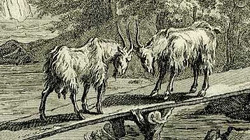
You can measure the depth of your understanding – and to say it bluntly, your intelligence – by the number of points of view you apply when you consider something or someone[1].
The multiplication of your points of view which you are able to hold in your mind is a powerful lever of freedom.
*
How then do you discover what is your point of view?
By asking yourself. Care to reflect for a moment. Ask someone you trust to describe to you what your point of view seems to be, compared with other possible ones.
And other people’s points of view?
Nothing special is needed, just observe, listen and give at least a thought to what other positions are possible.
Stop practicing that truth is one, that right opinion is one and they are all yours.
[1]See research on this subject called “semantic differential”. The good news is that you can educate yourself to consider more points of view and so, grow more intelligent.
[2]"Tittha Sutta: Various Sectarians (1)" (Ud 6.4), translated from the Pali by John D. Ireland. Access to Insight, June 14, 2010, http://www.accesstoinsight.org/tipitaka/kn/ud/ud.6.04.irel.html.
 RSS Feed
RSS Feed